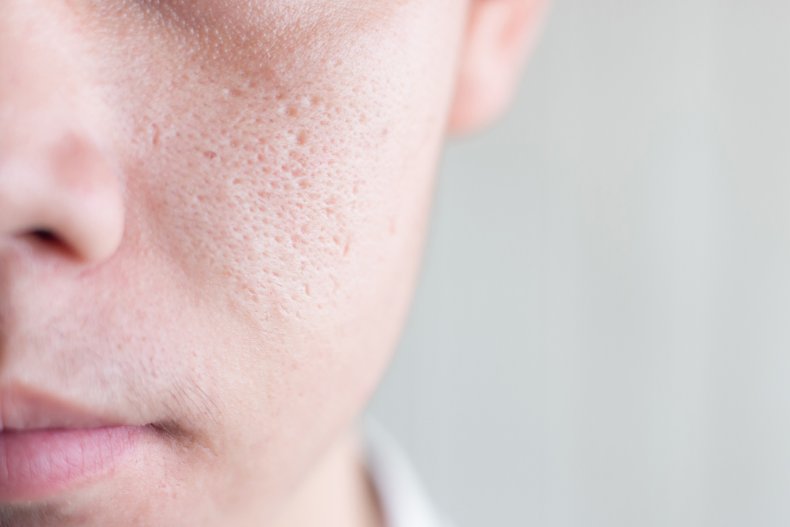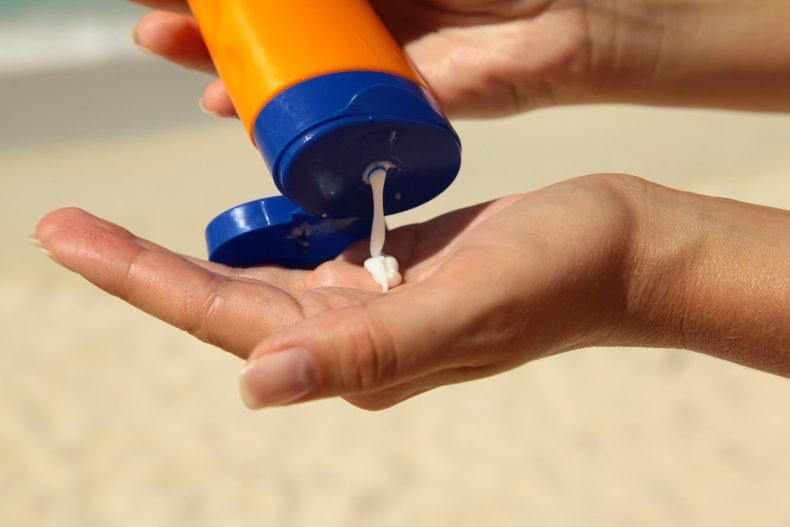Biggest Skin Care Mistakes You Have No Idea You’re Making
Myths about skin care are ubiquitous on the internet and many people engage in practices they think may be beneficial but are not necessarily a good idea.
Dermatologists have told Newsweek some of the most common myths are when it comes to looking after our skin.
Myth: Pore vacuums and pore strips will shrink pores
One common myth is that using pore vacuums or pore strips repeatedly will shrink your pores—the tiny openings in the skin that release oils and sweat.
“Your pores are your pores, they don’t open and close like windows,” Fatima Fahs, a board-certified dermatologist in Michigan and found of Dermy Doc Box, told Newsweek. “That being said, certain products can make them appear smaller.
“Exfoliating dead skin and oil build up that clogs your pores can help, like a gentle physical exfoliator or beta hydroxy acid (salicylic acid) serums and toners.”
Topical retinols can also help to improve the appearance of pores by decreasing the production of sebum—an oily substance produced in the sebaceous glands that helps to maintain moisture in the skin, Fahs said.

iStock
If you do not protect your pores from sun damage, by using sunscreen for example, the collagen in the skin can break down, which can make them appear larger over time as we age.
“Using pore vacuums and pore strips can be satisfying and make them appear clean for a moment, but it can also be highly irritating to the skin, cause capillary breakage and does not offer any long term solution to this problem, as the sebum builds right back up,” Fahs said.
Myth: Soap and water is better than hand sanitizer
Many people think that washing with soap and water is better than using a hand sanitizer. But this is not necessarily the case, according to Steve Daveluy, a board-certified dermatologist who is a professor at Wayne State Dermatology.
“Hand sanitizer is more gentle than soap and water,” Daveluy told Newsweek. “We all know that frequent hand-washing is hard on the skin. It can cause dryness and irritation. What many people don’t know is that hand sanitizer is better for your skin than soap and water.
“Hand sanitizer typically contains ingredients that moisturize the skin,” he said.
“Sometimes you need to wash with soap and water: before eating, after using the bathroom, or when your hands are visibly soiled. Otherwise, it’s better to use hand sanitizer. If your skin is cracked or open, sanitizer can sting a little, but you can still use it if the stinging it tolerable.”
Myth: Natural skin care products and at-home remedies are better for you
A frequently-held-belief is that “natural” skin care products and at-home remedies are better for us. But Daveluy said natural products, which are often derived from plants, are not always necessarily safer.
“Many people think that natural products are safer on the skin. Natural products can be great, but they also carry a risk of allergy,” Daveluy said. “I love to point out to my patients that poison ivy is 100 percent natural, but I don’t recommend you use it on your skin.
“Some products derived from plants contain beneficial compounds, but they may also contain other parts of the plant that aren’t helpful and can cause allergy or irritation. Just because you’re using a natural product, don’t assume it’s safe. If you are getting a rash or irritation, you should stop using it and see a board-certified dermatologist.”
Some at-home remedies that are used in an attempt to cure skin ailments can also sometimes do more harm than good by causing irritation, according to Daveluy.
“I see many people with rashes or itchy bumps on their skin who attempt treatment at home with things that irritate the skin,” he said. “Rubbing alcohol is a common culprit. Alcohol can be useful for cleansing the skin, but it’s also irritating and can damage the skin. Hydrogen peroxide is similar in that it can cleanse the skin, but is also an irritant.
“It’s ok to use alcohol or peroxide to clean a cut or abrasion, but you only need to use it once. You shouldn’t apply alcohol or peroxide on a rash, and it shouldn’t be applied to the skin repeatedly for any reason.”
Myth: Topical steroids are unsafe to use
Topical steroids are one of the most frequently prescribed drugs in dermatology and are used to treat a variety of conditions. But there is a common perception that these drugs are particularly harmful.
“There are a lot of people who talk online about ‘steroid addiction’ and ‘steroid withdrawal.’ These are actual issues, but they are very rare and occur with inappropriate use of topical steroids, usually applying potent steroids to the face for weeks or months, even when there is no rash or skin problem,” Daveluy said.
“They are safe and effective at treating skin disease. They can have side effects when overused, but they are very safe when used appropriately.
“If you have a skin rash that improves with topical steroids, but comes back when you stop using them, that’s not steroid addiction. That’s just a skin disease that responds to topical steroids. Eczema and psoriasis are great examples. Topical steroids can clear them up, but they aren’t cured, so they come back if you stop using the steroid.”
If you are worried about using a topical steroid, talk to a board-certified dermatologist who can advise you on the safest way to use the drug.

iStock
Myth: Wearing sunscreen will prevent vitamin D production
Sun exposure, specifically exposure to ultraviolet B (UVB) rays, kickstarts a process in the body that produces vitamin D—a vital nutrient important for bone health and the immune system, among other functions.
Many people think that using sunscreen will stop the production of vitamin D because they block UVB radiation. But research indicates that this is not necessarily the case.
“Researchers have never been able to prove that everyday sunscreen use leads to vitamin D deficiency,” Fahs said. “This is likely because no sunscreen can completely block UV radiation 100 percent, even if applied perfectly. So even with sunscreen on, you can still produce vitamin D.”
The position statement of the Cancer Council Australia, which has been endorsed by the the Australasian College of Dermatologists, among other medical societies, also comes to a similar conclusion.
“When sunscreen is tested in laboratory conditions it is shown to limit the effectiveness of vitamin D production, however, population studies have shown that regular use of sunscreen has little effect on vitamin D levels,” the paper said.
Dermatologists say getting sun exposure without protection is not a safe way to build up levels of vitamin D in the body due to the risk of developing skin cancer.

Comments are closed.